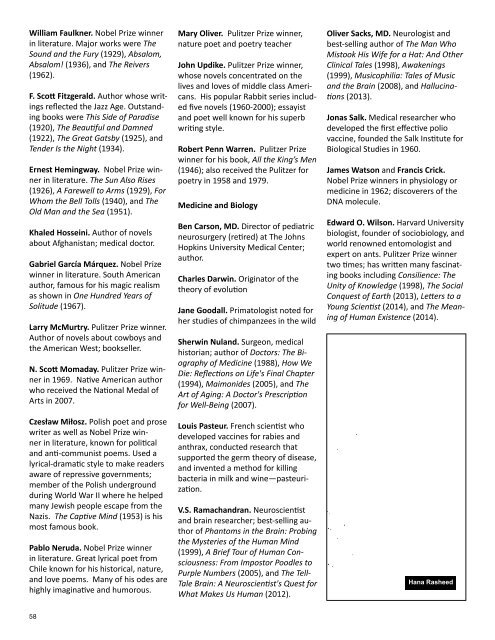Torrance Journal for Applied Creativity
TorranceJournal_V1
TorranceJournal_V1
You also want an ePaper? Increase the reach of your titles
YUMPU automatically turns print PDFs into web optimized ePapers that Google loves.
William Faulkner. Nobel Prize winner<br />
in literature. Major works were The<br />
Sound and the Fury (1929), Absalom,<br />
Absalom! (1936), and The Reivers<br />
(1962).<br />
F. Scott Fitzgerald. Author whose writings<br />
reflected the Jazz Age. Outstanding<br />
books were This Side of Paradise<br />
(1920), The Beautiful and Damned<br />
(1922), The Great Gatsby (1925), and<br />
Tender Is the Night (1934).<br />
Ernest Hemingway. Nobel Prize winner<br />
in literature. The Sun Also Rises<br />
(1926), A Farewell to Arms (1929), For<br />
Whom the Bell Tolls (1940), and The<br />
Old Man and the Sea (1951).<br />
Khaled Hosseini. Author of novels<br />
about Afghanistan; medical doctor.<br />
Gabriel García Márquez. Nobel Prize<br />
winner in literature. South American<br />
author, famous <strong>for</strong> his magic realism<br />
as shown in One Hundred Years of<br />
Solitude (1967).<br />
Larry McMurtry. Pulitzer Prize winner.<br />
Author of novels about cowboys and<br />
the American West; bookseller.<br />
N. Scott Momaday. Pulitzer Prize winner<br />
in 1969. Native American author<br />
who received the National Medal of<br />
Arts in 2007.<br />
Czesław Miłosz. Polish poet and prose<br />
writer as well as Nobel Prize winner<br />
in literature, known <strong>for</strong> political<br />
and anti-communist poems. Used a<br />
lyrical-dramatic style to make readers<br />
aware of repressive governments;<br />
member of the Polish underground<br />
during World War II where he helped<br />
many Jewish people escape from the<br />
Nazis. The Captive Mind (1953) is his<br />
most famous book.<br />
Pablo Neruda. Nobel Prize winner<br />
in literature. Great lyrical poet from<br />
Chile known <strong>for</strong> his historical, nature,<br />
and love poems. Many of his odes are<br />
highly imaginative and humorous.<br />
Mary Oliver. Pulitzer Prize winner,<br />
nature poet and poetry teacher<br />
John Updike. Pulitzer Prize winner,<br />
whose novels concentrated on the<br />
lives and loves of middle class Americans.<br />
His popular Rabbit series included<br />
five novels (1960-2000); essayist<br />
and poet well known <strong>for</strong> his superb<br />
writing style.<br />
Robert Penn Warren. Pulitzer Prize<br />
winner <strong>for</strong> his book, All the King’s Men<br />
(1946); also received the Pulitzer <strong>for</strong><br />
poetry in 1958 and 1979.<br />
Medicine and Biology<br />
Ben Carson, MD. Director of pediatric<br />
neurosurgery (retired) at The Johns<br />
Hopkins University Medical Center;<br />
author.<br />
Charles Darwin. Originator of the<br />
theory of evolution<br />
Jane Goodall. Primatologist noted <strong>for</strong><br />
her studies of chimpanzees in the wild<br />
Sherwin Nuland. Surgeon, medical<br />
historian; author of Doctors: The Biography<br />
of Medicine (1988), How We<br />
Die: Reflections on Life's Final Chapter<br />
(1994), Maimonides (2005), and The<br />
Art of Aging: A Doctor's Prescription<br />
<strong>for</strong> Well-Being (2007).<br />
Louis Pasteur. French scientist who<br />
developed vaccines <strong>for</strong> rabies and<br />
anthrax, conducted research that<br />
supported the germ theory of disease,<br />
and invented a method <strong>for</strong> killing<br />
bacteria in milk and wine—pasteurization.<br />
V.S. Ramachandran. Neuroscientist<br />
and brain researcher; best-selling author<br />
of Phantoms in the Brain: Probing<br />
the Mysteries of the Human Mind<br />
(1999), A Brief Tour of Human Consciousness:<br />
From Impostor Poodles to<br />
Purple Numbers (2005), and The Tell-<br />
Tale Brain: A Neuroscientist's Quest <strong>for</strong><br />
What Makes Us Human (2012).<br />
Oliver Sacks, MD. Neurologist and<br />
best-selling author of The Man Who<br />
Mistook His Wife <strong>for</strong> a Hat: And Other<br />
Clinical Tales (1998), Awakenings<br />
(1999), Musicophilia: Tales of Music<br />
and the Brain (2008), and Hallucinations<br />
(2013).<br />
Jonas Salk. Medical researcher who<br />
developed the first effective polio<br />
vaccine, founded the Salk Institute <strong>for</strong><br />
Biological Studies in 1960.<br />
James Watson and Francis Crick.<br />
Nobel Prize winners in physiology or<br />
medicine in 1962; discoverers of the<br />
DNA molecule.<br />
Edward O. Wilson. Harvard University<br />
biologist, founder of sociobiology, and<br />
world renowned entomologist and<br />
expert on ants. Pulitzer Prize winner<br />
two times; has written many fascinating<br />
books including Consilience: The<br />
Unity of Knowledge (1998), The Social<br />
Conquest of Earth (2013), Letters to a<br />
Young Scientist (2014), and The Meaning<br />
of Human Existence (2014).<br />
Hana Rasheed<br />
58


